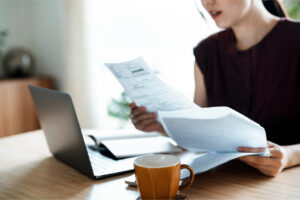As we on the StreetEasy economic research team prep our annual tax returns, we couldn’t help but think of all the taxes first-time buyers in New York City should consider. While there might not be too many people who actually like to think about taxes, they’re incredibly important and can significantly impact your decision on where and when to buy a home. There’s no better time to consider how your taxes might affect a future home purchase than when you file, so with Tax Day rapidly approaching (April 18 for all you slackers), here’s a rundown of some of the tax considerations you should keep top of mind. (Disclaimer: We at StreetEasy are data nerds, not tax nerds, so we recommend consulting an accountant for more details on how buying a home might affect your financial situation.)
Make Your Mortgage Pay
The mortgage interest tax deduction ranks as one of the most attractive benefits of buying a home. When you take out a mortgage to finance your home purchase, you’ll agree to pay equal monthly installments over time. For a typical 30-year fixed-rate mortgage, a portion of this payment will go toward interest due on the balance of the loan, and a portion will go toward reducing the total amount owed on that balance. Because of the way mortgages are structured, a larger amount of money will go toward interest due on the balance of the loan in the early years of the mortgage. For most New Yorkers itemizing deductions on their tax returns, this amount can be deducted from their federal income taxes and lower the amount due (or for you lucky ones, increasing the refund) at tax time.
An Example: Jane Buys in Harlem
Let’s walk through an example: Jane purchases a condo in Harlem for $600,000, putting 30 percent down and taking out a $420,000 30-year mortgage at 4 percent. Her monthly payment on her mortgage is $1,995, and over the course of her first year with the mortgage, she’ll pay $16,665 in interest and $7,268 toward her balance. With an annual gross income of $125,000, Jane pays a total of 31.65 percent in federal, state, and local taxes. Her accountant helped her itemize her deductions this year, so she’ll get to claim the full mortgage interest deduction for both her federal and state returns, saving her $5,274.
That’s a nice chunk of money for Jane! This is also a huge savings relative to renting that anyone considering buying their first home in NYC should take into account. We often point to our tipping point calculation – the number of years it takes to recover the benefits of homeownership to outweigh the costs relative to renting – as a way to evaluate whether purchasing a home makes sense for someone. In our Q4 2016 market report, we calculated that Jane should be prepared to stay in her new home in Harlem for 4.9 years in order to have homeownership be a smart financial decision relative to renting, a figure that assumed Jane would fully deduct her mortgage interest. If she isn’t able to that, we estimate she should plan to stay in her home another 22 months in order for homeownership to be a sensible financial decision for her.
Adding Up Property Taxes
Another enormous tax consideration for potential buyers are property taxes, which add thousands of dollars to the cost of owning each year. If we assume Jane will pay a modest $500 a month in property taxes, she’ll need to add $6,000 to the cost of owning a home. Happily, property taxes are generally deductible from tax bills, which saves Jane an additional $1,900 a year.
Mortgage interest and property taxes together will cost Jane roughly $1,900 a month in her first year of homeownership, a figure that doesn’t include mortgage principal payments (roughly $600) or condo fees or common charges ($500 or more). All told that’s at least $3,000 that Jane will be on the hook for each month. But with the ability to claim tax deductions, the total she’ll actually pay over the course of a year will be smaller, about $2,400. That’s certainly a substantial amount of money, but the $600 in monthly tax savings can be a serious factor when Jane is trying to evaluate whether she should rent or buy.
Hidden Benefits of Homeownership
Buying a home in New York is a major investment for just about anyone, and there are plenty of examples of owners in New York who have turned handsome profits in a short period of time. When some New Yorkers talk about the profit potential of owning a home, they tend to fixate on home price appreciation or the difference between the purchase price and selling price as the financial return in owning a home. But there is another aspect worth considering, particularly at tax time.
Let’s assume Jane could rent her home for $2,500. That means she would pay 5 percent of the value of her investment in rent per year – a nice additional return in a time of low-interest rates. If Jane could invest in a bond or savings account that paid her 5 percent a year, she would be taxed on that 5 percent. But no matter Jane’s tax status, the rent she saves by owning her own home is tax-free. The better comparison is between $2,500 a month rent on a $600,000 apartment is the interest paid on an investment yielding 7.3 percent, which after tax would yield 5 percent.
Consult a Professional
While the list here isn’t comprehensive, if you did file recently and are considering buying a home, these are all things you should be thinking about and perhaps even asking your accountant about (if he or she isn’t too stressed out, these folks tend to be busy this time of year). It is also worth talking through these issues with your agent, attorney, and mortgage banker during your home search process. There are a lot of caveats to these issues. But for most homeowners in New York, the taxman’s treatment of your home is a huge consideration and should be more than an afterthought on Tax Day.
Happy filing!








